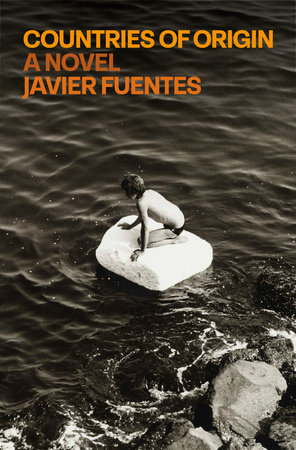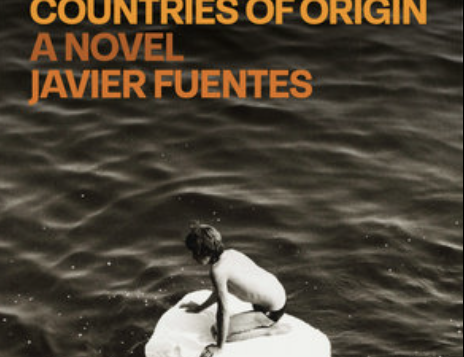 COUNTRIES OF ORIGIN
COUNTRIES OF ORIGIN
by Javier Fuentes
Pantheon. 294 pages, $27.
In Javier Fuente’s new novel, Countries of Origin, readers are introduced to 24-year-old Demetrio Simancas, one of the most talented pastry chefs in New York. While his friends spent their teenage years skating on the streets of the Lower East Side, Demetrio learned “to surf the heat waves radiating from convection ovens.”
Demetrio was born an orphan in Spain to a drug addicted mother who died when he was sixteen; his father was never in the picture. He was also orphaned from the country of his birth, having entered the U.S. illegally when he was a child. He lives with his polyamorous, Marxist uncle, Chus, who fled fascist Spain back in the ‘60s and became a professor of humanities at City College of New York?. Demetrio’s dream is to become Head of Pastries at the Four Seasons, write a dessert cookbook, and open his own pastry shop.
Unfortunately, when he is finally offered a position as a head pastry chef, Demetrio realizes he has to settle his citizenship status first. The novel takes place during the George W. Bush administration when immigration reform was stalled in Congress. A lawyer tells Demetrio that his only option is to leave the U.S., accept a ten-year ban, and then apply for a work visa.
Three weeks after receiving this news— on a plane to Madrid— Demetrio meets Jacobo, a super-rich, “model-cute” guy with whom he strikes up a mildly flirtatious conversation. “What’s the craziest thing you’ve ever done?” Jacobo asks, confessing that he once had sex for money. As the plane begins its descent, Demetrio notices that Jacobo’s leg is touching his own. Maybe being deported won’t be so bad after all, he thinks.
After landing in Madrid, Demetrio develops a high fever and passes out. Jacobo whisks him off to his family’s home to convalesce. During his stay with Jacobo— waited on by the servants— Demetrio learns that his new friend lives a life that is one, endless summer. Even when Jacobo is not wearing his Rolex, his BlackBerry (it’s 2007) is sticking out of his pocket, and the espadrilles he wears indicate that he’s a very privileged kid.
Jacobo takes Demetrio under his wing, helping him find an apartment, taking him on expensive jaunts to the beach and, in many other subtle ways, making Demetrio more dependent on him. He introduces Demetrio to his old boarding school friends— aristocrats, druggies, jet setters, bad boys. Meanwhile, Demetrio still doesn’t have a job, but sees hanging out with Jacobo as a way to “avoid the inevitability of looking for a job and settling in a country that had the unfair responsibility of becoming [his]home.”
On one of their carefree outings, the two get into a fight. Jacobo accuses Demetrio of feeling both superior and inferior: “You believe you’re better than me. Because I’m not self-made like you, because I haven’t suffered what you have. But you’re like every other fucking gay I know, obsessed with meeting the perfect person, a person that only exists in your imagination.”
The turbulent relationship between Demetrio, a fully-out gay man, and Jacobo, who professes to be straight but is also interested in sharing a bed with his buddy from time to time, is one of the most interesting aspects of this novel. Fuentes, who was a 2018 Lambda Literary fellow, beautifully captures the fluid, undefinable sexuality of millennials. And he does so in a way that keeps readers sympathetic to both of these drifting young men.
As Demetrio and Jacobo’s relationship develops, Demetrio feels that, if forced to choose, “[he]would rather become an unconditional friend and not another person to fuck.” Nevertheless, despite this ambivalence, he and Jacobo, who has broken up with his girlfriend, consider going steady. It’s bad timing, though, because Jacobo has to return to New York, but he proposes he fly back for Columbus Day weekend.
Meanwhile, Demetrio lands a job at an upscale Madrid restaurant and is soon offered a partnership; his name will appear on the menu next to the head chef’s. But, Fuentes allows us to question: is this the kind of success he really wants? Jacobo’s mother, a member of the Spanish nobility and a kind of parental figure for Demetrio, counsels him, “There’s nothing strange about wanting to experience the world fully. Life is now.”
The novel ends with a fairy-tale, deus ex machina conclusion, one that almost too neatly wraps up the many strands— culinary, geopolitical, and romantic— of Demetrio’s journey. But it’s an ending that opens his eyes to “how life sometimes gives you what you want but never the way you expect it.”
There are many things to admire in Fuentes’ novel. His evocation of Madrid’s many neighborhoods is superb: a bar in the Plaza del Dos de Mayo; the festive energy of the diverse Lavapiés neighborhood; the ancient limestone façades of the Barrio Salamanca. And his descriptions of food! Meyer lemon and saffron tarte with handmade ricotta; pastelitos de guayaba; seared squid stuffed with meringue sauce; marigold ice cream; roasted red plum with mascarpone purée; butterscotch coolant with chocolate soup.
Deftly-plotted, Countries of Origin is an impressive debut novel. It features a varied, and sharply-drawn, cast of characters. Fuentes’ prose is genial and engaging. Written in first person, the book reads as if Demetrio is penning a very long letter to a good friend. It’s a quick, breezy read, but a heck of a lot better than a beach read. Fuentes, who was born in Barcelona in 1974, can proudly add his name to the roster of English and American authors—Conrad and Nabokov come immediately to mind—whose first language was not English.
Philip Gambone, a regular contributor to The G&LR, is the author of five books, most recently As Far As I Can Tell: Finding My Father in World War II, which was named one of the Best Books of 2020 by the Boston Globe.






